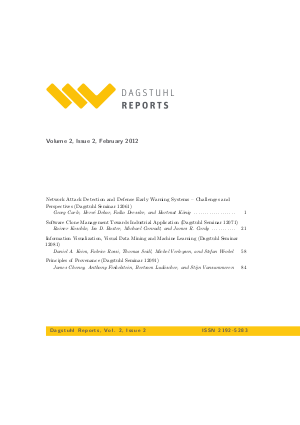Dagstuhl Reports, Volume 2, Issue 2
-
Part of:
Volume:
Dagstuhl Reports, Volume 2
Journal: Dagstuhl Reports (DagRep)

Event
- Dagstuhl Seminars 12061, 12071, 12081, 12091
Publication Details
- published at: 2012-06-19
- Publisher: Schloss Dagstuhl – Leibniz-Zentrum für Informatik
- DBLP: db/journals/dagstuhl-reports/dagstuhl-reports2
Access Numbers
- Detailed Access Statistics available here
-
Total Document Accesses (updated on a weekly basis):
0PDF Downloads
Documents
Dagstuhl Reports, Volume 2, Issue 2, February 2012, Complete Issue
Abstract
Cite as
Dagstuhl Reports, Volume 2, Issue 2, Schloss Dagstuhl – Leibniz-Zentrum für Informatik (2012)
Copy BibTex To Clipboard
@Article{DagRep.2.2,
title = {{Dagstuhl Reports, Volume 2, Issue 2, February 2012, Complete Issue}},
journal = {Dagstuhl Reports},
ISSN = {2192-5283},
year = {2012},
volume = {2},
number = {2},
publisher = {Schloss Dagstuhl -- Leibniz-Zentrum f{\"u}r Informatik},
address = {Dagstuhl, Germany},
URL = {https://drops.dagstuhl.de/entities/document/10.4230/DagRep.2.2},
URN = {urn:nbn:de:0030-drops-35347},
doi = {10.4230/DagRep.2.2},
annote = {Keywords: Dagstuhl Reports, Volume 2, Issue 2, February 2012, Complete Issue}
}
Dagstuhl Reports, Table of Contents, Volume 2, Issue 2, 2012
Abstract
Cite as
Dagstuhl Reports, Volume 2, Issue 2, pp. i-ii, Schloss Dagstuhl – Leibniz-Zentrum für Informatik (2012)
Copy BibTex To Clipboard
@Article{DagRep.2.2.i,
title = {{Dagstuhl Reports, Table of Contents, Volume 2, Issue 2, 2012}},
pages = {i--ii},
journal = {Dagstuhl Reports},
ISSN = {2192-5283},
year = {2012},
volume = {2},
number = {2},
publisher = {Schloss Dagstuhl -- Leibniz-Zentrum f{\"u}r Informatik},
address = {Dagstuhl, Germany},
URL = {https://drops.dagstuhl.de/entities/document/10.4230/DagRep.2.2.i},
URN = {urn:nbn:de:0030-drops-35335},
doi = {10.4230/DagRep.2.2.i},
annote = {Keywords: Table of Contents, Frontmatter}
}
Network Attack Detection and Defense Early Warning Systems - Challenges and Perspectives (Dagstuhl Seminar 12061)
Abstract
Cite as
Georg Carle, Hervé Debar, Falko Dressler, and Hartmut König. Network Attack Detection and Defense Early Warning Systems - Challenges and Perspectives (Dagstuhl Seminar 12061). In Dagstuhl Reports, Volume 2, Issue 2, pp. 1-20, Schloss Dagstuhl – Leibniz-Zentrum für Informatik (2012)
Copy BibTex To Clipboard
@Article{carle_et_al:DagRep.2.2.1,
author = {Carle, Georg and Debar, Herv\'{e} and Dressler, Falko and K\"{o}nig, Hartmut},
title = {{Network Attack Detection and Defense Early Warning Systems - Challenges and Perspectives (Dagstuhl Seminar 12061)}},
pages = {1--20},
journal = {Dagstuhl Reports},
ISSN = {2192-5283},
year = {2012},
volume = {2},
number = {2},
editor = {Carle, Georg and Debar, Herv\'{e} and Dressler, Falko and K\"{o}nig, Hartmut},
publisher = {Schloss Dagstuhl -- Leibniz-Zentrum f{\"u}r Informatik},
address = {Dagstuhl, Germany},
URL = {https://drops.dagstuhl.de/entities/document/10.4230/DagRep.2.2.1},
URN = {urn:nbn:de:0030-drops-34761},
doi = {10.4230/DagRep.2.2.1},
annote = {Keywords: early warning systems, critical infrastructure protection, botnets, intrusion detection, malware assessment, vulnerability analysis, network monitoring, flow analysis, denial-of-service detection and response, event correlation, attack response and countermeasures}
}
Software Clone Management Towards Industrial Application (Dagstuhl Seminar 12071)
Abstract
Cite as
Rainer Koschke, Ira D. Baxter, Michael Conradt, and James R. Cordy. Software Clone Management Towards Industrial Application (Dagstuhl Seminar 12071). In Dagstuhl Reports, Volume 2, Issue 2, pp. 21-57, Schloss Dagstuhl – Leibniz-Zentrum für Informatik (2012)
Copy BibTex To Clipboard
@Article{koschke_et_al:DagRep.2.2.21,
author = {Koschke, Rainer and Baxter, Ira D. and Conradt, Michael and Cordy, James R.},
title = {{Software Clone Management Towards Industrial Application (Dagstuhl Seminar 12071)}},
pages = {21--57},
journal = {Dagstuhl Reports},
ISSN = {2192-5283},
year = {2012},
volume = {2},
number = {2},
editor = {Koschke, Rainer and Baxter, Ira D. and Conradt, Michael and Cordy, James R.},
publisher = {Schloss Dagstuhl -- Leibniz-Zentrum f{\"u}r Informatik},
address = {Dagstuhl, Germany},
URL = {https://drops.dagstuhl.de/entities/document/10.4230/DagRep.2.2.21},
URN = {urn:nbn:de:0030-drops-34775},
doi = {10.4230/DagRep.2.2.21},
annote = {Keywords: Software clones, code redundancy, clone detection, redundancy removal, software refactoring, software reengineering, plagiarism detection, copyright infringement, source differencing}
}
Information Visualization, Visual Data Mining and Machine Learning (Dagstuhl Seminar 12081)
Abstract
Cite as
Daniel A. Keim, Fabrice Rossi, Thomas Seidl, Michel Verleysen, and Stefan Wrobel. Information Visualization, Visual Data Mining and Machine Learning (Dagstuhl Seminar 12081). In Dagstuhl Reports, Volume 2, Issue 2, pp. 58-83, Schloss Dagstuhl – Leibniz-Zentrum für Informatik (2012)
Copy BibTex To Clipboard
@Article{keim_et_al:DagRep.2.2.58,
author = {Keim, Daniel A. and Rossi, Fabrice and Seidl, Thomas and Verleysen, Michel and Wrobel, Stefan},
title = {{Information Visualization, Visual Data Mining and Machine Learning (Dagstuhl Seminar 12081)}},
pages = {58--83},
journal = {Dagstuhl Reports},
ISSN = {2192-5283},
year = {2012},
volume = {2},
number = {2},
editor = {Keim, Daniel A. and Rossi, Fabrice and Seidl, Thomas and Verleysen, Michel and Wrobel, Stefan},
publisher = {Schloss Dagstuhl -- Leibniz-Zentrum f{\"u}r Informatik},
address = {Dagstuhl, Germany},
URL = {https://drops.dagstuhl.de/entities/document/10.4230/DagRep.2.2.58},
URN = {urn:nbn:de:0030-drops-35064},
doi = {10.4230/DagRep.2.2.58},
annote = {Keywords: Information visualization, visual data mining, machine learning, nonlinear dimensionality reduction, exploratory data analysis}
}
Principles of Provenance (Dagstuhl Seminar 12091)
Abstract
Cite as
James Cheney, Anthony Finkelstein, Bertram Ludaescher, and Stijn Vansummeren. Principles of Provenance (Dagstuhl Seminar 12091). In Dagstuhl Reports, Volume 2, Issue 2, pp. 84-113, Schloss Dagstuhl – Leibniz-Zentrum für Informatik (2012)
Copy BibTex To Clipboard
@Article{cheney_et_al:DagRep.2.2.84,
author = {Cheney, James and Finkelstein, Anthony and Ludaescher, Bertram and Vansummeren, Stijn},
title = {{Principles of Provenance (Dagstuhl Seminar 12091)}},
pages = {84--113},
journal = {Dagstuhl Reports},
ISSN = {2192-5283},
year = {2012},
volume = {2},
number = {2},
editor = {Cheney, James and Finkelstein, Anthony and Ludaescher, Bertram and Vansummeren, Stijn},
publisher = {Schloss Dagstuhl -- Leibniz-Zentrum f{\"u}r Informatik},
address = {Dagstuhl, Germany},
URL = {https://drops.dagstuhl.de/entities/document/10.4230/DagRep.2.2.84},
URN = {urn:nbn:de:0030-drops-35073},
doi = {10.4230/DagRep.2.2.84},
annote = {Keywords: Provenance, Lineage, Metadata, Trust, Repeatability, Accountability}
}